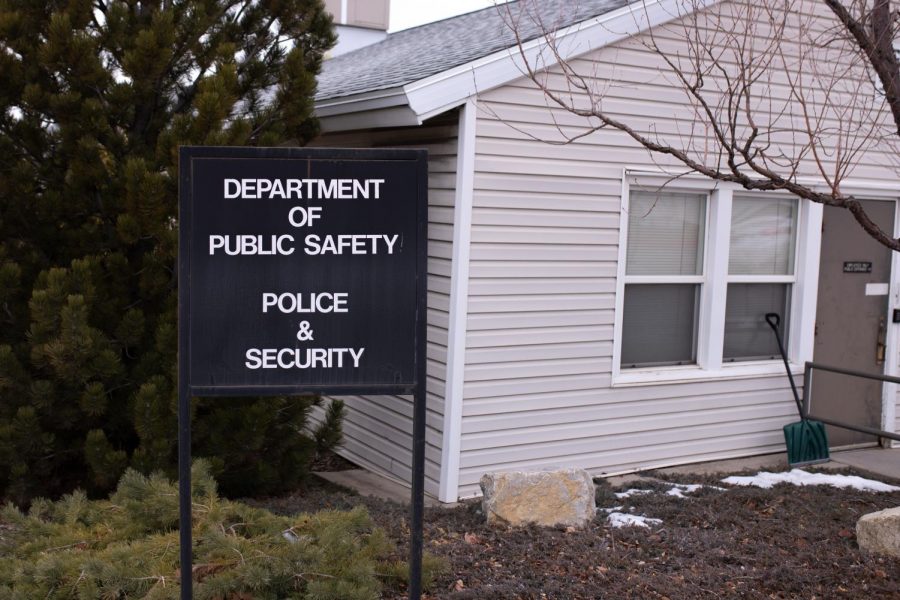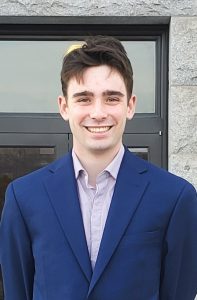Campus Safety Bill Heads to Governor’s Desk After Lengthy Legislative Process
Department of Public Safety on Campus in Salt Lake City. (Photo by Maya Fraser | Daily Utah Chronicle)
March 14, 2021
On March 5, SB163 campus safety amendments passed in the House with 50 in support and 24 opposed with plans for it to take effect on July 1, 2021.
Written by co-founders of UnsafeU, Rebecca Hardenbrook and Devon Cantwell, in collaboration with the Utah System of Higher Education, SB163 is a bill focused on improving campus safety.
After receiving a phone call from Senator Jani Iwamoto saying she was interested in UnsafeU’s work, the authors started drafting the bill in Oct. 2020 in an effort to make policies for student safety.
“We were honestly a little wary of her ask because often when we are invited into these decision-making spaces there is this silent expectation that we will make some serious compromises as to what we want to see,” Hardenbrook said.
However, the authors were surprised and relieved when Iwamoto supported them completely and immediately got to work on drafting the bill.
“We met very frequently to draft language and would often thoroughly go through each and every word to make sure we were explicit in the policy so that schools could not wiggle out of certain aspects of it,” Hardenbrook said. “We also were very aware that there could possibly be institutional opposition to the bill, and by working with USHE and university attorneys we were able to anticipate any arguments against the bill, which was critical in ensuring it didn’t die immediately when it got to committee.”
Breaking Down the Bill
The final version of the bill, which eventually passed in March, has two main components.
First, the bill requires campus and local police to share reporting information. Rather than people having to refile their complaints, if local or campus law enforcement erroneously receives a report which falls into the jurisdiction of the other, the information is automatically shared between the two authorities.
“It’s already hard for people to report once. Asking them to repeat that story a second time is incredibly difficult and it’s unnecessary, frankly,” Cantwell said.
Second, the bill requires higher education institutions to disaggregate crime data so students know the safest dorms and best evening classes to take.
“We think this is going to be really important because we know that students are really concerned, you know if I stay at the library late at night is my chance of getting sexually assaulted high?” Cantwell said. “We’ll actually have data to show whether those rates are high or not.”
The disaggregation of data is especially important because it applies to off-campus buildings like Block 44 which are still under HRE’s jurisdiction. On June 30, 2020, UnsafeU posted about a number of sexual assaults at Block 44 between Nov. 2019 and Jan. 2020.
“The University’s argument essentially was we don’t have jurisdiction over it and so we didn’t do anything about it, but they also didn’t inform the student that they didn’t have jurisdiction over Block 44, and so that student never knew to go to SLCPD and refile their case,” Cantwell said.
Hardenbrook said the components in SB163 are policy solutions UnsafeU has demanded from the U since the founding of the group.
“A lot of the institutional issues that these would solve were severely highlighted after Lauren was murdered, and since then we have received hundreds of messages from students regarding their negative experiences in reporting traumatic events which reflect these same structural issues,” she said. “We wanted to focus on the primary issues that we could identify as the root problems for so many safety issues.”
Partisan Opposition
Originally included in the bill was a student-run, state-level Safety and Equity Commission which has since been stripped due to concerns about conservative voices being silenced on campus.
“We took out the equity piece of this as the first compromise on it because frankly, it doesn’t really matter what the commission’s called, we can still look at things through an equity lens,” Cantwell said.
The commission would have been made up of 10 to 13 students from all higher education institutions to facilitate information sharing about successful programs, have direct student insight on safety issues and establish a commission independent of institutional bias.
“There’s no reason we need to be waiting until the crisis pops up to address campus safety issues, it should be ongoing work,” Cantwell said.
Cantwell said the problem with existing independent review boards, like the two set up this year at the U, is that they only review the Department of Public Safety and do not have jurisdiction to scrutinize investigative practices or policies of offices outside the DPS.
“Campus safety is a thing that’s on a lot of people’s minds, it’s why it’s taking up as much oxygen as it has in the last two years and people are going to look at that data and they need to be able to compare across institutions…so that they can feel safe,” Cantwell said.
The commission was cut from the bill by the Senate Education Committee after the provision received pushback from Republican leadership about the commission silencing conservative voices on campus, concerns about adding another special commission and potential costs. However, Cantwell said the commission would not cost any money.
“It’s honestly like a smart, sensible, fiscal strategy for the state because honestly, we will probably avoid millions of dollars of lawsuits by being able to catch stuff early before it becomes an actual crisis,” Cantwell said.
Senate Education Committee Chairman John Johnson (R-19) had free speech concerns surrounding this portion of the bill and believed it to be part of a larger progressive agenda.
While the commission was removed from the bill, Hardenbrook and Cantwell still plan to move forward with it in collaboration with USHE.
According to Hardenbrook, the Young Republicans echoed Johnson’s concerns and actively lobbied against the bill saying it wanted to censor conservative voices.
“Student safety is not a partisan issue, it’s not a political issue, it’s an issue of the rights of all students. The truth is, which is somehow impossible for some folks to digest, that campus safety issues disproportionately affect women, students of color, students that are members of the LGBTQ+ community and students who are differently-abled,” Hardenbrook said.
Hardenbrook said the logic the Young Republicans have of the promotion of safety for students who are disproportionately affected by being in direct opposition to free speech is false.
“You can both promote equity in our campus safety and protect free speech. What we can not do is promote equity in campus safety policy and allow hate speech to persist. Hate speech is not protected speech. Hate speech is violence, and hate speech does not make students safe,” Hardenbrook said.
Cantwell said in order to prevent students from taking safety measures into their own hands, it is necessary to have support from conservative students.
“I’ll admit, our org runs pretty progressive on stuff and I know folks can feel like that runs antithetical to conservative values but at the end of the day when we’re talking about campus safety policy, we’re not going to throw populations under the bus,” Cantwell said.
Due to its controversial nature and calls for institutional accountability, Hardenbrook and Cantwell were surprised the bill passed at all, especially as it was voted on in the last minutes of the legislative session after several substitutions.
“This isn’t just Rebecca and I’s victory or UnsafeU’s victory,” Cantwell said. “This is a victory for all students in Utah that we were able to collectively work together to form policy, and that we got a big policy win that gives students more power.”









